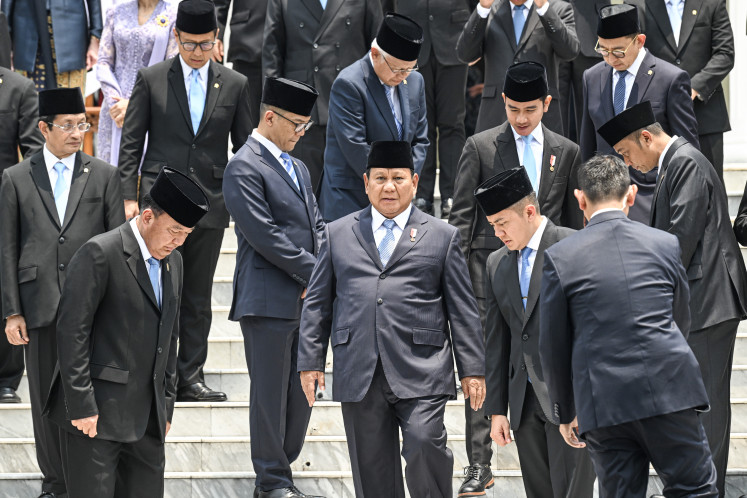Popular Reads
Top Results
Can't find what you're looking for?
View all search resultsPopular Reads
Top Results
Can't find what you're looking for?
View all search resultsRI ambassador calls Palestine’s chairmanship of G77 historic
Indonesia has commended Palestine’s assumption of the chairmanship of the Group of 77 (G77) and China, calling the moment historic and a step in the right direction for Palestinian statehood, an issue it is prioritizing in its two-year membership on the United Nations Security Council (UNSC)
Change text size
Gift Premium Articles
to Anyone
I
ndonesia has commended Palestine’s assumption of the chairmanship of the Group of 77 (G77) and China, calling the moment historic and a step in the right direction for Palestinian statehood, an issue it is prioritizing in its two-year membership on the United Nations Security Council (UNSC).
Indonesian Ambassador to the UN Dian Triansyah Djani, who attended the handover ceremony in New York, said Indonesia fully supported Palestinian leadership in G77, the UN’s biggest bloc of developing nations.
“The inauguration of Palestine as chair of the Group of 77 and China is a historic moment that signifies developing countries’ trust in Palestine as a member of the international community,” he said in a statement dated Tuesday in New York.
Established in 1964, G77 and China has a strategic role as the only negotiating group for developing countries, especially for financial-economic, development and humanitarian issues in the UN framework.
Having joined the UNSC as a non-permanent member this year, Indonesia is expected to prioritize Palestinian independence in its two-year membership.
“Indonesia is very concerned about the changes in attitudes of several countries that are in conflict with various UN resolutions, which should be respected and become the basis for resolving the Israeli-Palestinian conflict,” Foreign Minister Retno Marsudi said in her annual address on Jan. 9.
“For Indonesia, the two-state solution is the only solution. Peace efforts must still be made in the corridor of the two-state solution.”
Indonesia is likely to face challenges in cooperating with pro-Israel countries, experts say, most notably the United States, which, along with four other permanent council members, has the power to veto any tabled council resolutions.
Indonesia, Kuwait and Equatorial Guinea are the few countries on the UNSC that maintain no diplomatic relations with Israel.
Outside of the UNSC, Indonesia also has a different stance than that of its closest southern neighbor, Australia, which voted against Palestine’s chairmanship for the G77 and China at the UN General Assembly in October, together with the US and Israel, while 146 countries supported Palestine and 15 abstained.
Indonesia’s staunch support for Palestine resulted in a major rift with Australia, which recognizes West Jerusalem as the Israeli capital and planned to move its embassy there“when practical”.
Currently, out of 193 UN member states, 137 countries, including Indonesia, recognize Palestine as an independent and sovereign state.
In 2012, the UN General Assembly overwhelmingly approved the de facto recognition of the sovereign state of Palestine when it upgraded the Palestinian Authority’s observer status to that of a non-member observer state.
The status upgrade allows Palestine to participate in some UN General Assembly votes and join some international bodies. However, as a non-member state, Palestine cannot speak in meetings until after member states, according to diplomats.
As G77 chair, Palestine would be able to operate like a member state, making statements, submitting and co-sponsoring proposals and amendments, giving rights of reply and raising points of order.
Palestinian President Mahmoud Abbas accepted the chairmanship from Egyptian Foreign Minister Sameh Shoukry as the outgoing chairman.
Abbas said Palestine would confront the “assaults” on multilateralism and pledged to seek a peaceful two-state solution to the Israeli-Palestinian conflict.
“I reaffirm the state of Palestine’s commitment to international law and legitimacy and to a peaceful solution that brings an end to the occupation and the realization of the independence of the state of Palestine, with East Jerusalem as its capital, living side by side in peace and security with the state of Israel on the basis of the 1967 borders,” he said.










